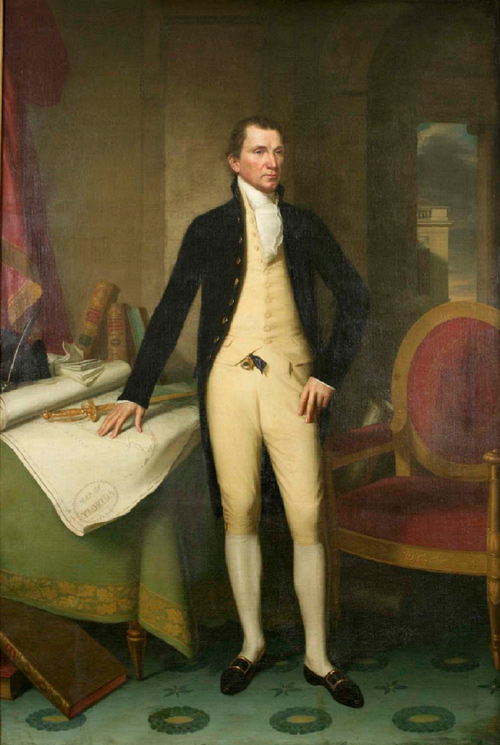As James Monroe prepares to negotiate with France for Louisiana, President Jefferson writes a letter telling him about the “two million bill” and what would become known as the Lewis and Clark Expedition.
James Monroe (1758-1831)
copy by James Sharples (1751–1811)
of a portrait by Thomas Sully (1783–1872)
Independence National Historical Park.
Spread on the table in the above, is a “Map of Florida.” Originally asked to obtain Western Florida in the French and Spanish negotiations of 1803, Florida remained in Spanish control when Monroe was elected as the fifth President of the United States. As the portrait intimates, he long held the acquisition of Florida close to his heart. He finally accomplished his mission with the Adams-Ónis Treaty of 1819.
The Two Million Bill
Dear Sir
. . . . .
Congress having passed the two million bill, you will recieve by this mail your last dispatches. others will follow you about the 2d. week of April, before which time I shall be returned from Monticello. I set out for that place on the 6th. of March.
The “Missisipi” Expedition
Congress has given authority for exploring the Missisipi, which however is ordered to be secret. this will employ about 10. persons two years.
present my friendly respects to mrs Monroe & Eliza, and accept my best wishes for a pleasant voyage, happy result, and assurances of my constant & affectionate attachment
Th. Jefferson[1]“Thomas Jefferson to James Monroe, 25 February 1803,” Founders Online, National Archives, founders.archives.gov/documents/Jefferson/01-39-02-0494 accessed 3 May 2022. [Original source: … Continue reading
Youngest of the Virginia westernizers, Monroe served in the Revolutionary War, studied law with Thomas Jefferson, and from early in his career identified with U.S. control of Mississippi valley. He was sent to France to calm western fears that President Jefferson might not push hard enough for a solution to the Louisiana problem. His administration as the fifth president (1817-25) was called the “Era of Good Feeling.”
Notes
| ↑1 | “Thomas Jefferson to James Monroe, 25 February 1803,” Founders Online, National Archives, founders.archives.gov/documents/Jefferson/01-39-02-0494 accessed 3 May 2022. [Original source: The Papers of Thomas Jefferson, vol. 39, 13 November 1802–3 March 1803, ed. Barbara B. Oberg. Princeton: Princeton University Press, 2012, p. 584.] |
|---|
Experience the Lewis and Clark Trail
The Lewis and Clark Trail Experience—our sister site at lewisandclark.travel—connects the world to people and places on the Lewis and Clark Trail.
Discover More
- The Lewis and Clark Expedition: Day by Day by Gary E. Moulton (University of Nebraska Press, 2018). The story in prose, 14 May 1804–23 September 1806.
- The Lewis and Clark Journals: An American Epic of Discovery (abridged) by Gary E. Moulton (University of Nebraska Press, 2003). Selected journal excerpts, 14 May 1804–23 September 1806.
- The Lewis and Clark Journals. by Gary E. Moulton (University of Nebraska Press, 1983–2001). The complete story in 13 volumes.


